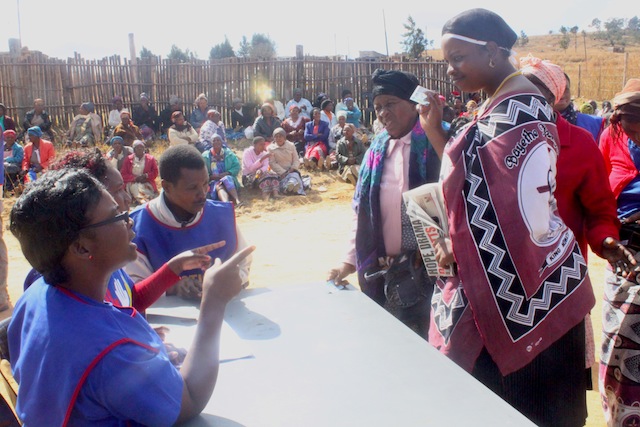Swazi Chiefs Shut Women Out of Parliament

MBABANE, Aug 21 (IPS) - Archaic and chauvinistic practices are being used to prevent Swazi women from taking part in the upcoming primary elections, despite the country having a constitution that guarantees their rights, says political analyst Dr. Sikelela Dlamini.
"The discrimination women by preventing them from participating in politics is a consequence of deeply-rooted notions of male dominance and the subordination of women," Dlamini told IPS.
He was reacting to a recent warning issued by the chief of Ludzibini, Prince Magudvulela, who told his subjects that they should not vote for women in mourning during the country's Aug. 24 primary election.
It was clear during the meeting that Magudvulela was referring to former member of parliament and a contender for the Timphisini constituency, Jennifer Du Pont. She lost her husband, Bheki Shiba, in May and mourned him for a month instead of the normal two-year period. She is running for a second term of office.3
During an Aug. 17 meeting at the Ludzibini Royal Kraal in northern Swaziland, Magudvulela told his followers that according to customary practice, women in mourning were not allowed inside parliament, royal residences and near the King. Magudvulela said that electing women in mourning to parliament would be an embarrassment to the chiefdom.
Swaziland, a landlocked nation in southern Africa with a population of just over one million people, is ruled by a polygamist monarch, King Mswati III. Here political parties are not allowed to contest for power but individuals are elected to parliament from 55 constituencies know as "Tinkhundla". The constituencies are sub-divided into 385 chiefdoms or districts nationwide. In the primary elections voters choose candidates from their chiefdoms who will then contest the secondary elections and compete against other candidates in their constituency for a seat in parliament.
"You must vote for someone that the King will be able to use," Magudvulela had said.
Magudvulela told his followers that even though, according to the country's constitution, Du Pont had a right to decide whether she followed the custom of mourning or not, customary law was still superior to the constitution.
Du Pont, who attended the meeting, was devastated by the chief's conduct but said that she was still determined to win the elections.
"I'll launch a complaint with the Elections and Boundaries Commission (EBC)," she told IPS.
Local chiefs play a huge role in the election process here. Swaziland's EBC gives them the responsibility to decide where in their local districts to hold the elections.
Since the election process began, some chiefs have told their subjects not to elect gay people or those who belong to political parties.
King Mswati III , when dissolving parliament on Aug. 2, told the nation to elect people that he would be "able to use". It was a statement that has been criticised by the progressive movement.
"It might look like it is just advice from the authorities, but this was a way of telling people what to do," head of department in theology and religious practices at the University of Swaziland (UNISWA), Nonhlanhla Vilakati, told IPS.
Du Pont was not the only woman to be discriminated against ahead of this election.
When Mana Mavimbela was nominated to run for a seat in parliament in the Lusabeni constituency, EBC presiding officer Lindiwe Sukati disqualified her because she was wearing pants.
"The presiding officer just asked the audience if a woman wearing pants be allowed inside a cattle byre," Mavimbela told IPS of the Aug. 4 incident. "When the people said ‘no', she just moved on."
She has since launched a complaint with the EBC.
"I was nominated and I haven't done anything wrong in terms of the law that would have disqualified me," Mavimbela said. She was the only woman out of four candidates nominated from her area.
Mavimbela was also summoned to appear before the Lusabeni chiefdom where local headman Zephaniah Dlamini said that it was unacceptable for women in the district to wear pants.
"Women don't look good in pants and the chiefdom banned them from wearing pants," Dlamini told local newspaper, Times of Swaziland.
Mavimbela said that she had apologised to the Royal Kraal council on Aug. 10, because she feared for her destitute family who live in rural Ncandvweni, in southern Swaziland.
But Vilakati said that the chiefs' conduct was not surprising in a country where people are expected to live according to the public transcript.
"We have no gender policy in the country and people react in different ways depending on their living realities," said Vilakati.
Women in rural areas tend to face more challenges with regards to customary practices compared to their urban counterparts, Vilakati noted.
While EBC chairperson Prince Gija condemned the violation of women's rights on the basis of customary practices, he said he had no control over the chiefs.
"The chiefs are appointed by the King," he told IPS. "The EBC can only advise them civic education, but we have no power to reprimand them."
Gija admitted, however, that chiefs play a big role in the Swazi elections.
However, giving chiefs the right to run the elections is an anomaly on its own, said UNISWA law lecturer, Maxine Langwenya.
"The EBC is abdicating its responsibility because the constitution is very clear that the EBC should run the elections," Langwenya told IPS.
© Inter Press Service (2013) — All Rights ReservedOriginal source: Inter Press Service
 Global Issues
Global Issues